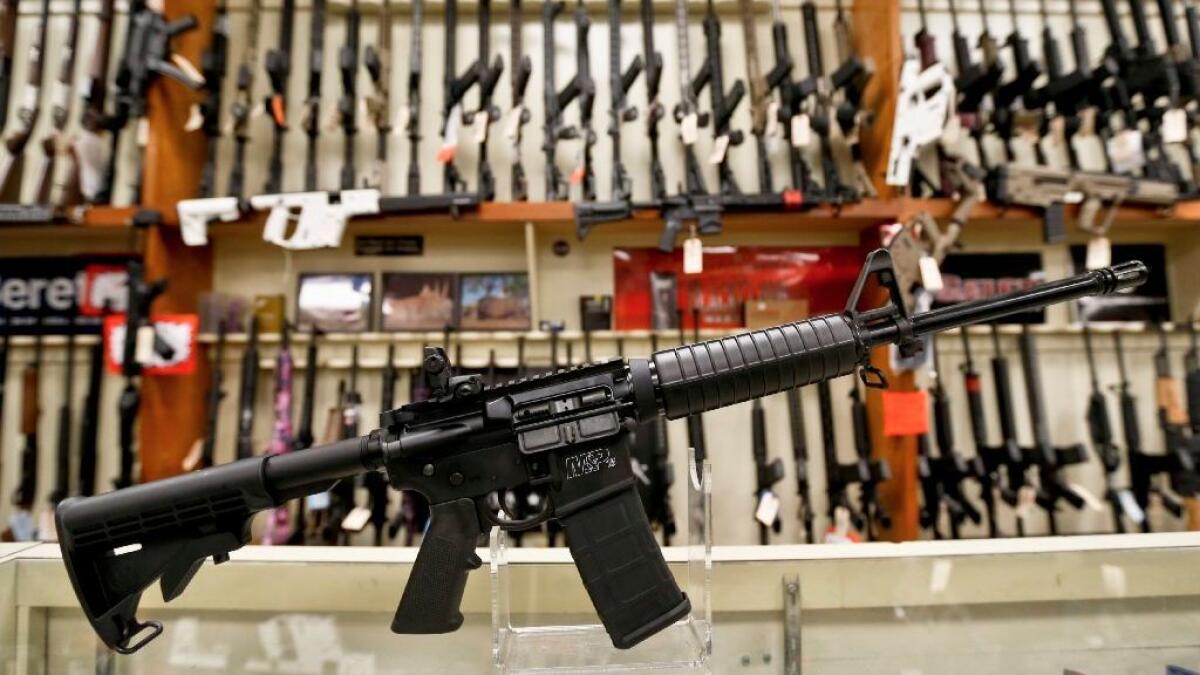Op-Ed: A new way to reduce gun suicides, and maybe mass shootings too

- Share via
Mass shootings dominate the headlines and seem to drive the movement to change gun policy, but reducing gun suicides could save many more lives. More than 20,000 people each year kill themselves with a gun; that’s twice the number of gun homicides. The Parkland, Fla., massacre claimed 17 lives; roughly 59 people die by gun suicide each day.
An innovative new law could bring down this tragic death toll. Washington will soon become the first state in the country to enact a “firearm choice” law. It passed by wide margins in the state Senate and House, with support from Democrats as well as Republicans, and is now awaiting Gov. Jay Inslee’s signature.
Give people who believe that they may become a risk to themselves or others a way to put distance between themselves and firearms.
The idea is simple: Give people who believe that they may become a risk to themselves or others a way to put distance between themselves and firearms. Under the new law, Washington citizens can add their names to a do-not-sell list, thereby suspending their ability to buy guns from licensed dealers.
Legislative consensus around this program was achievable because the measure is entirely voluntary. No one is taking away anyone’s right to bear arms.
Adding your name to the list does not have to be a permanent choice. Those who sign up can later change their minds. They need only make the request and wait seven days. The Washington law in essence gives people the right to opt in to a waiting period.
Two recent studies have shown that purchase delays are effective in reducing suicide. Waiting periods work because suicide is often impulsive. Even if someone turned away at a gun dealership attempts suicide using another method, he is much more likely to survive than if he’d used a firearm. And only 10% of people who survive a suicide attempt go on to die by self-harm.
Washington will be the first to enact a firearm choice law, but legislators in California and three other states have introduced versions of it. Some would make the waiver more durable by having participants wait up to three weeks before their rescission becomes effective, or by having them convince a judge or a psychiatrist that they are not a risk to themselves or others.
The Washington law also gives participants the option of designating a third-party contact to be notified “if a voluntary waiver of firearm rights is revoked.” The California bill expands this option by allowing participants to “list up to five electronic mail addresses with the registry to be contacted promptly if the person subsequently requests that his or her name be removed from the registry.” These notification options, which were the brainchild of Washington state Sen. Jamie Pedersen, can give a registrant’s friends, family or healthcare providers, for example, timely warning to check in with a registrant before he regains his right to purchase a weapon.
We have conducted two surveys that suggest a substantial proportion of at-risk people would choose this method of self-defense. One study of people seeking psychiatric care at a major medical center found that 46% would restrict their future gun purchases in this way. A more recent study of internet users found that about a third of the general population, and 43% of those who had been previously diagnosed with a mental disorder, would be willing to waive the right to purchase or possess guns.
These studies show that many people who are at an elevated risk of harming themselves or others are willing during moments of clarity to figuratively tie their own hands.
The firearm-choice idea is a natural addition to the red flag statutes that already exist in several states and are under active consideration in others. These statutes give police and private citizens the ability to bring ex parte petitions for temporary gun removal if they can convince a court that a particular person poses risk of “imminent personal injury to self or others.”
Although red flag statutes represent the more obvious path to preventing mass shootings, firearm choice laws could help in this area as well. Two months before the Parkland massacre, the suspected shooter, Nikolas Cruz, called 911 and told the dispatcher that he “kind of got mad, and I started punching walls.” Cruz’s call to 911 was a cry for help. If the dispatcher had given him the option to temporarily waive his right to purchase and possess firearms, he, like hundreds of people in our studies, might have voluntarily disarmed.
The state of Washington has shown that it is possible to enhance individual liberty by giving people a new firearm choice that will reduce gun deaths. It turns out that libertarian gun control is not an oxymoron.
Ian Ayres is a law professor at Yale. Fredrick Vars is a law professor at the University of Alabama
Follow the Opinion section on Twitter @latimesopinion or Facebook
More to Read
A cure for the common opinion
Get thought-provoking perspectives with our weekly newsletter.
You may occasionally receive promotional content from the Los Angeles Times.









